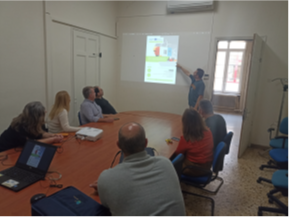1st Local Stakeholder Seminar of the Epirus Region
A meeting in Ioannina, organized by the Region of Epirus, focused on promoting sustainable energy practices in small and medium-sized industries (SMEs). The event gathered key stakeholders to address the challenges and opportunities in the local energy sector, emphasizing the need for renewable energy, energy efficiency and reducing fossil fuel dependence.
The regional leadership highlighted the role of sustainable energy in the region's development strategy, stressing that SMEs must reduce their reliance on fossil fuels. Energy consultants presented options for SMEs to integrate renewable energy sources, such as solar, wind and biomass, into their operations. They explained financial incentives and support programs available at the national and European levels, aimed at easing the financial burden of transitioning to clean energy.
Key Topics: Energy Efficiency and Renewable Energy
A significant portion of the meeting focused on energy efficiency. Industry representatives noted that many local SMEs operate with outdated infrastructure, leading to high energy waste. Experts presented case studies illustrating how modernizing equipment, improving insulation and adopting smart energy management systems can significantly reduce energy consumption and costs. The Region of Epirus committed to supporting SMEs by offering technical and financial assistance for energy audits, which help identify inefficiencies.
The role of renewable energy in promoting energy independence was another critical topic. Local experts emphasized the need for diversification in energy sources, especially considering recent global energy market instability. By investing in renewable energy like solar panels and small-scale wind turbines, SMEs can reduce their environmental impact and safeguard themselves from energy price fluctuations.
Collaboration and Action
Stakeholders identified several important measures to achieve the region’s sustainability goals. These included:
- Increasing the use of renewable energy: This working group will focus on identifying viable renewable energy sources for SMEs based on local conditions.
- Improving energy efficiency: Guidelines and best practices will be developed to help SMEs adopt energy-efficient technologies and practices.
- Promoting cooperation: A collaborative approach is necessary to overcome energy challenges. A group will facilitate dialogue between businesses, government and financial institutions to drive sustainable solutions.
The meeting concluded with a strong commitment to collaborative action, forming working groups to advance the key areas discussed. The Region of Epirus aims to position itself as a leader in the transition to a green economy by supporting local businesses in adopting sustainable energy practices. This initiative not only contributes to environmental protection but also strengthens the economic resilience of SMEs by promoting energy independence.
Conclusions
Looking ahead, follow-up meetings and workshops will ensure progress is maintained. These future discussions will aim to develop a comprehensive roadmap for the energy transition in Epirus, which could serve as a model for other regions in Greece and beyond. The success of this initiative hinges on the ongoing cooperation of all stakeholders, from local governments to private businesses, as they work together to secure a sustainable and energy-independent future for the region.
